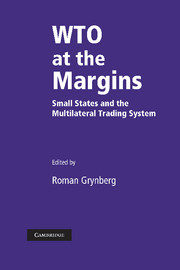Book contents
- Frontmatter
- Contents
- List of figures and appendices
- List of tables
- List of contributors
- Introduction
- Part I Theory and evidence
- Part II WTO and small economies
- Part III WTO dispute settlement
- Part IV Negotiating issues and institutional arrangements
- 17 WTO fisheries subsidies negotiations: implications for ACP fisheries access arrangements and sustainable management
- 18 Plurilateral financial standards and their regulation: the experience of small developing states
- 19 Export processing zones and the WTO Agreement on Subsidies and Countervailing Measures
- 20 The accession of Vanuatu to the WTO: lessons for the multilateral trading system
- Index
17 - WTO fisheries subsidies negotiations: implications for ACP fisheries access arrangements and sustainable management
Published online by Cambridge University Press: 05 May 2010
- Frontmatter
- Contents
- List of figures and appendices
- List of tables
- List of contributors
- Introduction
- Part I Theory and evidence
- Part II WTO and small economies
- Part III WTO dispute settlement
- Part IV Negotiating issues and institutional arrangements
- 17 WTO fisheries subsidies negotiations: implications for ACP fisheries access arrangements and sustainable management
- 18 Plurilateral financial standards and their regulation: the experience of small developing states
- 19 Export processing zones and the WTO Agreement on Subsidies and Countervailing Measures
- 20 The accession of Vanuatu to the WTO: lessons for the multilateral trading system
- Index
Summary
Introduction
After almost five years of discussion at the Committee on Trade and Environment, WTO members embarked upon negotiations on fisheries subsidies as a result of the decision reached by ministers at the 4th Ministerial Conference of the WTO at Doha. The ministerial decision was couched in language that explicitly recognised the importance of the sector to developing countries and clearly implied the development of appropriate special and differential treatment rules. Yet despite the language, the principal submission by the ‘Friends of Fish’, the majority of which are developing countries, there has been no substantive call for special and differential treatment from developing countries.
This chapter begins by briefly considering both the economic case for fisheries subsidies disciplines and the evidence of the magnitude of those subsidies. The analysis proceeds to consider the existing subsidies rules in the WTO and perceived weaknesses that may exist in those rules, and then reviews the negotiating positions of various WTO members in the Negotiating Group on Rules which is considering the fisheries subsidies issue. The chapter attempts to explain the need for special and differential treatment of developing coastal states in the current round of WTO negotiations in terms of the particular development needs of coastal states.
Particular reference is made to the situation in the Pacific island states, which are the source of 45 per cent of the world's tuna landings and for which, as some of the world's smallest and most vulnerable island states, the fisheries subsidies issue is of vital economic importance.
- Type
- Chapter
- Information
- WTO at the MarginsSmall States and the Multilateral Trading System, pp. 607 - 632Publisher: Cambridge University PressPrint publication year: 2006

